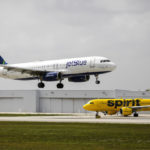
(WASHINGTON) — The Justice Department on Tuesday filed a lawsuit to stop the proposed merger between JetBlue and Spirit Airlines.
The $3.8 billion merger would create the nation’s fifth largest airline, and would be the first U.S. airline merger since 2016 when Alaska Airways bought Virgin Atlantic.
In anticipation of a DOJ lawsuit, JetBlue said a merger with Spirit would bring down costs for customers.
“The Big Four airlines have a lock on about 80% of the market,” the company said in a statement. “JetBlue’s combination with Spirit allows it to create a compelling national challenger to these dominant airlines, while also ensuring [ultra low cost carrier] options remain available in overlap markets.”
The company said it’s already made changes ahead of the merger and their routes do not overlap.
“JetBlue’s unique combination of low fares and great service is a competitive force that keeps the legacy carriers on their toes and results in lower fares,” the company said.
In the lawsuit filed in Massachusetts federal court, the Justice Department said that allowing the merger to go through would eliminate Spirit as the “the largest and fastest-growing ultra-low-cost carrier in the United States.”
Spirit, the Justice Department said, is allowing cost-conscious Americans the option to travel, and by eliminating this business model, it hurts competition for consumers.
“If the acquisition is approved, JetBlue plans to abandon Spirit’s business model, remove seats from Spirit’s planes, and charge Spirit’s customers higher prices,” the lawsuit says. “JetBlue’s plan would eliminate the unique competition that Spirit provides — and about half of all ultra-low-cost airline seats in the industry—and leave tens of millions of travelers to face higher fares and fewer options. Spirit itself put it simply: “A JetBlue acquisition of Spirit will have lasting negative impacts on consumers.”
Spirit’s model of unbundling certain services like carry-on baggage allows for consumers to chose what they want to pay for, which is their “secret weapon.”
“The rest of the industry — including JetBlue –has been forced to respond to Spirit’s innovations and low prices. Spirit estimates that when it starts flying a route, average fares fall by 17%; JetBlue estimates that when Spirit stops flying a route, average fares go up by 30%,” the lawsuit says. “Spirit’s success — and other airlines’ response to it—has led to the “Spirit Effect”: when Spirit enters a new route, prices for consumers across all airlines tend to fall and demand for air travel goes up.”
DOJ contends that Spirit serves a different population — families traveling for a vacation and not those traveling for work or something else.
“JetBlue’s acquisition would also dampen competition with other airlines,” the suit says. “Airlines do not always compete as aggressively as they could. Sometimes they take advantage of opportunities to soften competition through coordinated actions—like “follow-the-leader” price increases—that lead to higher fares or reduced capacity. Spirit has recognized it has “no obligation” to “follow the herd” when it comes to collective industry price increases. By contrast, JetBlue has already demonstrated its willingness to follow along with some of those opportunities to coordinate and would have increased incentives to do so if the acquisition goes through.”
The acquisition would dampen Spirit’s growth and reduce the number of seats on Spirit’s planes, according to DOJ. The department says that when JetBlue came into the market it was the disrupter, but now has transitioned to a “close ally” of the big four airline carriers.
“Spirit’s strategy of focusing on cost-conscious travelers has prompted other airlines to follow suit by introducing their own fare options to better compete,” the suit says.
The Justice Department notes that JetBlue has attempted to buy Spirit before – unsuccessfully in 2017 and 2019.
This is a developing story. Please check back for updates.
Copyright © 2023, ABC Audio. All rights reserved.
